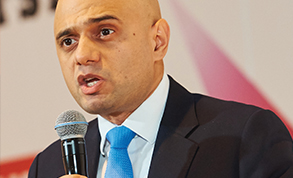Javid takes hard line on productivity and demand
 Speaking at the NHS Confederation conference in Liverpool, Mr Javid (pictured) said health spending had risen from around 27% of day-to-day public service spending at the turn of the century to 44% by 2024. The government would ensure the NHS had the funding it needed, but he insisted that funding was only part of the answer. ‘Growing health spending at double the rate of economic growth over the next decade, as I’ve heard some propose, is neither sustainable, desirable, nor necessary,’ he said.
Speaking at the NHS Confederation conference in Liverpool, Mr Javid (pictured) said health spending had risen from around 27% of day-to-day public service spending at the turn of the century to 44% by 2024. The government would ensure the NHS had the funding it needed, but he insisted that funding was only part of the answer. ‘Growing health spending at double the rate of economic growth over the next decade, as I’ve heard some propose, is neither sustainable, desirable, nor necessary,’ he said.
‘We face many structural challenges, from an ageing population and multiple long-term conditions. But demanding spending growth of this kind suggests that we will fail to reduce demand through prevention, early diagnosis and more effective care – as well as a fail to increase health and care productivity with improved use of capital, skills, management, data and innovative models of care. I refuse to countenance such failures.’
The NHS had to digitise, be smarter with capital spending, and transform its use of data. He acknowledged the workforce must grow in size, but NHS leadership must also improve, implement innovative care models, and build more personalised services.
Earlier, in her speech to the conference, NHS chief executive Amanda Pritchard highlighted the need to make best use of taxpayers’ money. She also told the conference that NHS England was reviewing capacity – both physical and virtual – acknowledging that the NHS had one of the lowest bed numbers among comparable health systems.
This was reflected in NHS efficiency figures. But she added: ‘We have passed the point at which that efficiency becomes inefficient.’
Mr Javid previewed a hectic year ahead, which includes: a reset for the NHS long-term plan; a white paper on health inequalities; 10-year plans on cancer, dementia and mental health; and the Health Education England workforce framework, which will be followed by a 15-year workforce strategy.
He added that the Health and Care Act 2022 would encourage more partnerships for reform. These reform partnerships would add to existing ventures, such as provider collaboratives, and could be used to support underperforming trusts. ‘I want to explore whether we make being part of a reform partnership a requirement for underperforming trusts,’ Mr Javid said.
‘I believe this could be powerful way to ensure that the leadership we need doesn’t stay in the walled gardens of England’s best performing trusts, but is there to help turn trusts round and with it, the health and happiness of those who live there.’
Nigel Edwards, Nuffield Trust chief executive, said it was difficult to argue against a focus on workforce, better use of digital technologies and tackling health inequalities.
But he added: ‘It’s hard to see how this blizzard of policy initiatives, coupled with a determination not to spend more, will address the fundamental problems wrought by years of underinvestment, woeful failures in workforce planning, and increased healthcare need. The NHS needs more people, not more policies.’
Mr Edwards said there is a danger that additional policy initiatives unsupported by extra spending will backfire. This could lead services to spend ‘large amounts of time looking upwards to Whitehall when they need to be tackling the backlog and delivering the best tailored care for patients in their local areas’.
‘Meanwhile the national policy initiatives that are needed, such as the hospital building programme and reforms to social care, are failing to deliver the results expected, he added.’
Related content
We are excited to bring you a fun packed Eastern Branch Conference in 2025 over three days.
This event is for those that will benefit from an overview of costing in the NHS or those new to costing and will cover why we cost and the processes.